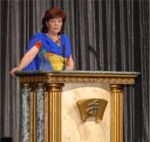Another part of philosophy is ethics. The term "Ethics" is usually defined as a study of moral standards and how they affect conduct or a system of moral principles or rules. This is a very limited concept and confuses ethics with morals when in fact they are two different things.
Scientology ethics, explained L. Ron Hubbard, are reason. They provide the means by which men conduct themselves toward their long-term survival, the survival of their families, their groups, their planet and more. Implicit within the subject is the recognition that all things are, to one degree or another, interdependent upon all else and that only by constantly considering the survival of the many can the individual ensure his own survival.
Scientology Ethics is a very practical thing and is oriented around survival as an interdependent activity. So, for example, destroying a rain forest may help increase the profits of a logging company or may help a poor farmer gain some land on which to grow crops, but in the long run it is destructive to the planet because now the trees are not changing carbon dioxide into oxygen and water and it is destructive to the farmer because dead trees will not cause the rain that is needed to grow the crops of the poor farmer. So to determine if an act is ethical or not one must take into account all the consequences and everything that is impacted.
Much of the Ethics of Scientology is covered in the book:
Introduction to Scientology Ethics




